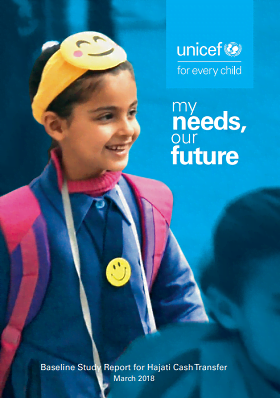My Needs, Our Future
Since the beginning of the 2017-2018 school year in Jordan, the United Nations Children’s Fund (UNICEF) Child Cash Grant (CCG) launched its new phase, an equity-driven, integrated social protection programme for all children in Jordan called Hajati, or ‘my need’ in Arabic. The new programme built on lessons learned from the CCG and the recommendations from the most recent Overseas Development Institute (ODI) independent monitoring report1. Hajati became a labelled cash transfer for education programme with a strong focus on school attendance monitoring, behaviour change communications, as well as home visit and case management activities in synergy with UNICEF’s flagship programme Makani.
This report presents the new programme design, its child focused targeting methodology and an in depth examination into the vulnerabilities observed in the surveyed population. With 28,902 households reached through a unified methodology that brought together vulnerable families in Jordan regardless of
their nationality, this report represents a unique opportunity to understand the degree of multi-sectoral vulnerabilities among Syrian refugees, Jordanians, and vulnerable families from other nationalities present in the Kingdom. The ‘cash plus’ approach proposed in Hajati builds on global best practices showing how cash
accompanied by additional services often has a more powerful and long-lasting effect on its beneficiaries.
UNICEF leverages its experience in education, child protection, health, Water Sanitation and Hygiene (WASH) and youth employment as well as on its network of 116 Makani Centres to ensure that any barrier which cannot be addressed by the additional financial resources delivered to the family is addressed through additional services which are delivered starting with a home visit to those families whose children pass a certain threshold of school absence.
As of January 2018, Hajati assists 53,333 children from 19,609 households with cash transfers of 20 Jordanian Dinar (JOD) per month per child. An effective communication channel through Short Message Service (SMS) was also implemented with households whose children are at risk of dropping out of school, and additional social protection services are triggered upon school absences. The typical household eligible for the Hajati programme has fled war in a neighbouring country (87 per cent), has three school-aged children who are likely (48 per cent) to study with at least a one year delay in their education experience, and have a considerable risk of dropping out before finishing basic education.
Hajati is intended to be a tool to reduce school dropout as a way to reduce marginalization. Thanks to a field driven sensitization campaign in Informal Tented Settlements (ITS) and host communities, Hajati managed to bring 3,241 children back to school who were previously out of school. This figure is expected to increase to 6,736 if Hajati beneficiaries’ families reach the same levels of attendance as ineligible families. Additionally, Hajati will contribute to keeping children in school that would have otherwise dropped out of school.
Hajati assists mainly Syrians (86 per cent), Jordanians (11 per cent), as well as Iraqis, Egyptians, Yemenis and other nationalities representing a 3 per cent minority in the eligible population. On average, they are below the country poverty threshold, they heavily rely on humanitarian assistance, and their net declared income is negative, hence they are not able to make ends meet. Health is also a major concern among the Hajati beneficiary population. More than half of the eligible families reported having a child fall sick with high fever and respiratory disease in the prior two weeks, and just 52 per cent of these families were able to procure medicine to treat their child.
